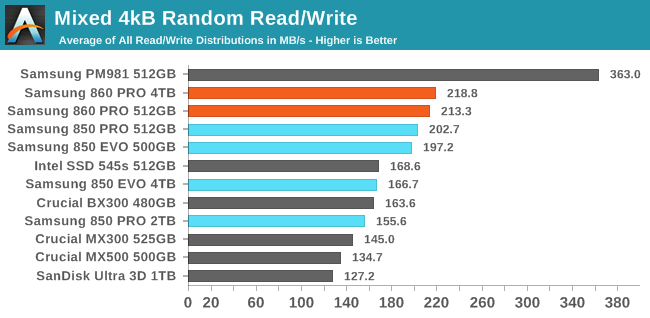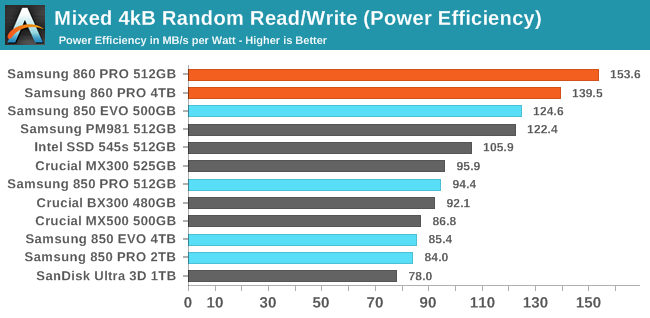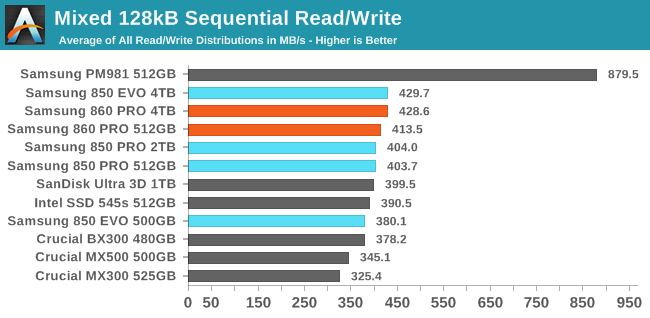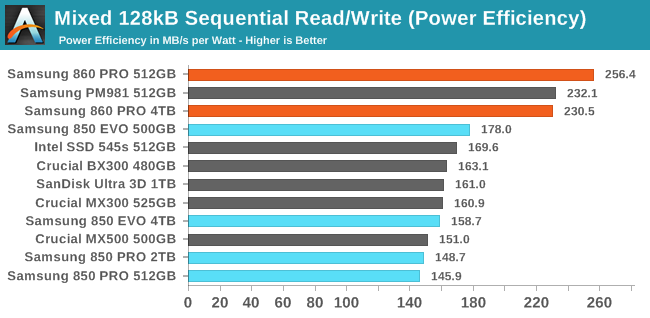The Samsung 860 PRO (512GB And 4TB) SSD Review: Replacing A Legend
by Billy Tallis on January 23, 2018 10:00 AM ESTMixed Random Performance
Our test of mixed random reads and writes covers mixes varying from pure reads to pure writes at 10% increments. Each mix is tested for up to 1 minute or 32GB of data transferred. The test is conducted with a queue depth of 4, and is limited to a 64GB span of the drive. In between each mix, the drive is given idle time of up to one minute so that the overall duty cycle is 50%.

The Samsung 860 PRO is the fastest SATA SSD on our mixed random I/O test, with the 4TB model scoring slightly better than the 512GB model. This is a big improvement over the multi-TB 850s which were substantially slower than the half-TB models.

The 850 PRO is again the most efficient drive in the bunch, but the 512GB model is clearly more efficient than the 4TB despite being a bit slower.
 |
|||||||||
At every stage of the mixed random I/O test, the 860 PRO draws less power than any of its competitors and it is only outperformed by the 4TB model and momentarily by the 512GB 850 PRO.
Mixed Sequential Performance
Our test of mixed sequential reads and writes differs from the mixed random I/O test by performing 128kB sequential accesses rather than 4kB accesses at random locations, and the sequential test is conducted at queue depth 1. The range of mixes tested is the same, and the timing and limits on data transfers are also the same as above.

Neither capacity of the Samsung 860 PRO quite manages to top the performance of the 4TB 850 EVO on the mixed sequential test, but they're close enough.

The power efficiency gap between the 860 PROs and the rest of the SATA SSDs is huge. The 512GB model takes first place, and the 4TB model is tied with the PM981 for second place efficiency.
 |
|||||||||
Samsung's SSDs tend to show lower performance during the second half of this test when the workloads are more write-heavy. The 860 PRO continues this pattern, but with very shallow performance dips.










64 Comments
View All Comments
WithoutWeakness - Tuesday, January 23, 2018 - link
Impressive drive. We've definitely hit the point where the SATA bottleneck prevents any serious performance improvements. Looks like the 860 EVO nearly matches the PRO's speeds (at least on paper) and costs 33% less at all capacities. It seems like the trend will continue of recommending the latest Samsung EVO drive to anyone who needs a SATA SSD and people with extra money to spend can upgrade to the PRO. Almost no reason to buy any other drives unless you can find them at ridiculous sale prices.generaldwarf - Tuesday, January 23, 2018 - link
the 860 evo is 33% cheaper and 50% less endurant = 860 pro is cheaper on the long runDanNeely - Tuesday, January 23, 2018 - link
Unless you're doing insanely high write levels (for anything in the consumer/prosumer space) both drives will probably fail in 5-10 years of old age without coming anywhere near their endurance limits. The pro just has extra overkill on that number.Flunk - Tuesday, January 23, 2018 - link
Definitely, for client loads you're not going to hit that write endurance before the drive dies from something else.But if the Samsung 860 PRO dies within 10 years it's still under warranty. I recently had a 4.5 year old Samsung 840 PRO die on me and Samsung shipped me an essentially brand new 850 PRO as a replacement. The EVO comes with a 5 year warranty, which while good, is not as good.
DanNeely - Tuesday, January 23, 2018 - link
The 860pro is down to the same 5 years as the 860 EVO.chrcoluk - Friday, September 6, 2019 - link
My 850 pro almost died at 4 years and 10 months (mirroring your view that a 5 year warranty is pushing it close).Sent to samsung RMA, they ran what was clearly a very basic test only (they completed RMA testing in just 40 mins according to status page) and returned as non faulty.
They returned a drive that was randomly not appearing at post and had corrupted boot files as non faulty. I didnt trust it so put it in a spare rig, installed windows on it, and ran some i/o tests, on the first test it locked up during heavy i/o load. After giving it a while to recover I rebooted and the drive was gone in bios, but this time it hasnt recovered at all now seemingly completely dead.
For the curious the erase cycles are extremely low only 40 or so erase cycles, data written was at over 20TB, nowhere near the 150TB warranty.
Given these figures I would say a higher amount of years on the warranty is far more valuable than a higher TBW limit, so the 860 pro's are a nerf. The fact samsung are no longer willing to offer 10 years on their pro units is quite telling. If the 10 year policy wasnt costing them money then they wouldnt mind doing it, which must mean the failure rate at 4+ years is high enough to warrant the change.
Alistair - Tuesday, January 23, 2018 - link
MX500 is cheaper, performs almost the same. And they actually provide warranty service in Canada properly, unlike Samsung.Check this forum:
https://forums.redflagdeals.com/has-anyone-dealt-s...
Samus - Wednesday, January 24, 2018 - link
Yeah, hard to ignore the MX500 and BX300 (if looking for a smaller capacity drive) because they are so easy to find, inexpensive, and the support is solid. I’ve had great luck with crucial/Micron drives, especially models with Marvell controllers, for nearly a decade. I’ll never forget when I installed the C300 in my laptop in 2010, my first experience with 500MB/sec data transfers and 5 second windows startups.Samus - Wednesday, January 24, 2018 - link
The long run of what? By the time the drive warranty is up SATA will go the way of PATA/IDE. Does anybody seriously think SATA will be around in 5 years? We already have consumer hard drives bottlenecked by SATA2!smilingcrow - Wednesday, January 24, 2018 - link
I fully expect SATA3 to be still around in 5 years. Hard Drives and even DVDs aren't going away and it would seem pointless to replace SATA for those types of devices as it offers sufficient bandwidth for years to come.